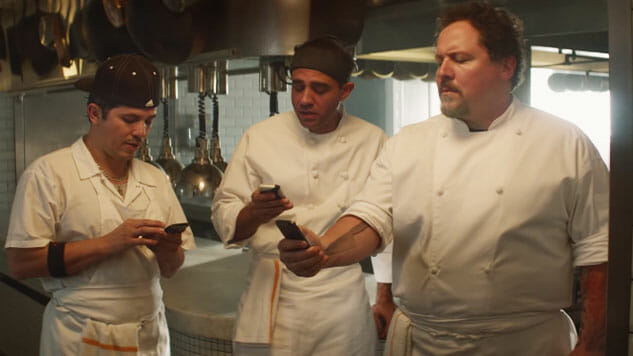Jon Favreau’s Chef Is about a Twitter Fight

Deep into 2019, over a decade since the microblogging/brain-atrophying social media platform Twitter launched, it’s almost a little quaint that a tussle between critics and artists should make headlines. Twitter’s reach is both over- and underestimated, with fewer users than either Facebook or Instagram, but a presence, seemingly never-ending, spent beneath the public microscope with regard to its handling of harassment, hate speech and abuse of power. The young people are sort of on Twitter, right? Stanning their favorite pop stars and such. Loud-mouthed writer people like me are on it, whiling away our hours making inane jokes or getting into arguments about Lord knows what. Really, that’s not a lot of people. Nonetheless, the likes of Lizzo, Michael Che and Olivia Munn all used Twitter to hit back at critics for…some reason. (We creatives, we are sensitive people.)
In fairness, artists will always be defensive of the art they create, and critics will always be defensive of the work they do, and both believe that they are acting in good faith while, when an enemy is codified in such an argument, their enemy is acting in bad faith. Artists may take certain actions to protect themselves at the cost of critics engaging with their work (in a professional context), or they will just write some kind of screed against critics and criticism, putting together a thrillingly weak strawman argument in the form of some grumpy, nasty fellow in a movie. There’s the cruel critic of Birdman, the soulless critic of The Lady in the Water, the caricaturish monster critic of HowardCantour.com. But such a decision—to build criticism in some form, or the engagement with criticism, into the work itself—is certainly fascinating in the digital media age, in a time where the role of the critic operates with precarity (at once dismissed by the public, secureless in employment and inexplicably able to garner “clout” online, if not necessarily health insurance), as it becomes an interesting artifact suggesting how we still engage with both art and criticism.
Jon Favreau’s Chef is especially curious in this case. Just over five years ago, Favreau—who’d had a fruitful acting career but an even more successful directing career helming Iron Man, the first film of what would become the behemoth Marvel Cinematic Universe—decided to take a break from the big-budget action tentpoles he’d been steering in favor for a little food porno movie about an artistically frustrated chef with a barely functional relationship with his son who decides to start a food truck. Kind of.
Actually, Chef is about a Twitter fight. A bad review, the art of which was a product of artistic stifling, sends Chef Carl Casper (Favreau) reeling. After the review goes viral on Twitter, he starts a fight with the critic, who then calls his bluff. Carl erupts in volcanic fury at the critic, which also goes viral, which costs him his job. While vague recollections about Chef being nominally about artist versus critic may linger in the heads of those who saw it five years ago, it would still sound surprising to most people to describe the film as being about and propelled by Twitter beef.
Twitter’s age was both new enough for the platform to be used in the film as a novelty and established enough for the characters to treat Carl like he’s an ancient boomer unfamiliar with the application. Though seven years old at the time, numbers like 123,845 (how many followers the food critic has) or 20,000 (how many followers Carl has after his meltdown proliferates online) were strong enough to be an early indicator of Twitter’s “strength” as a space in which people could talk (or snark) about art with the critic, the artist and the random audience member.
-

-

-

-

-

-

-

-

-

-

-

-

-

-

-

-

-

-

-

-

-

-

-

-

-

-

-

-

-

-

-

-

-

-

-

-

-

-

-

-








































